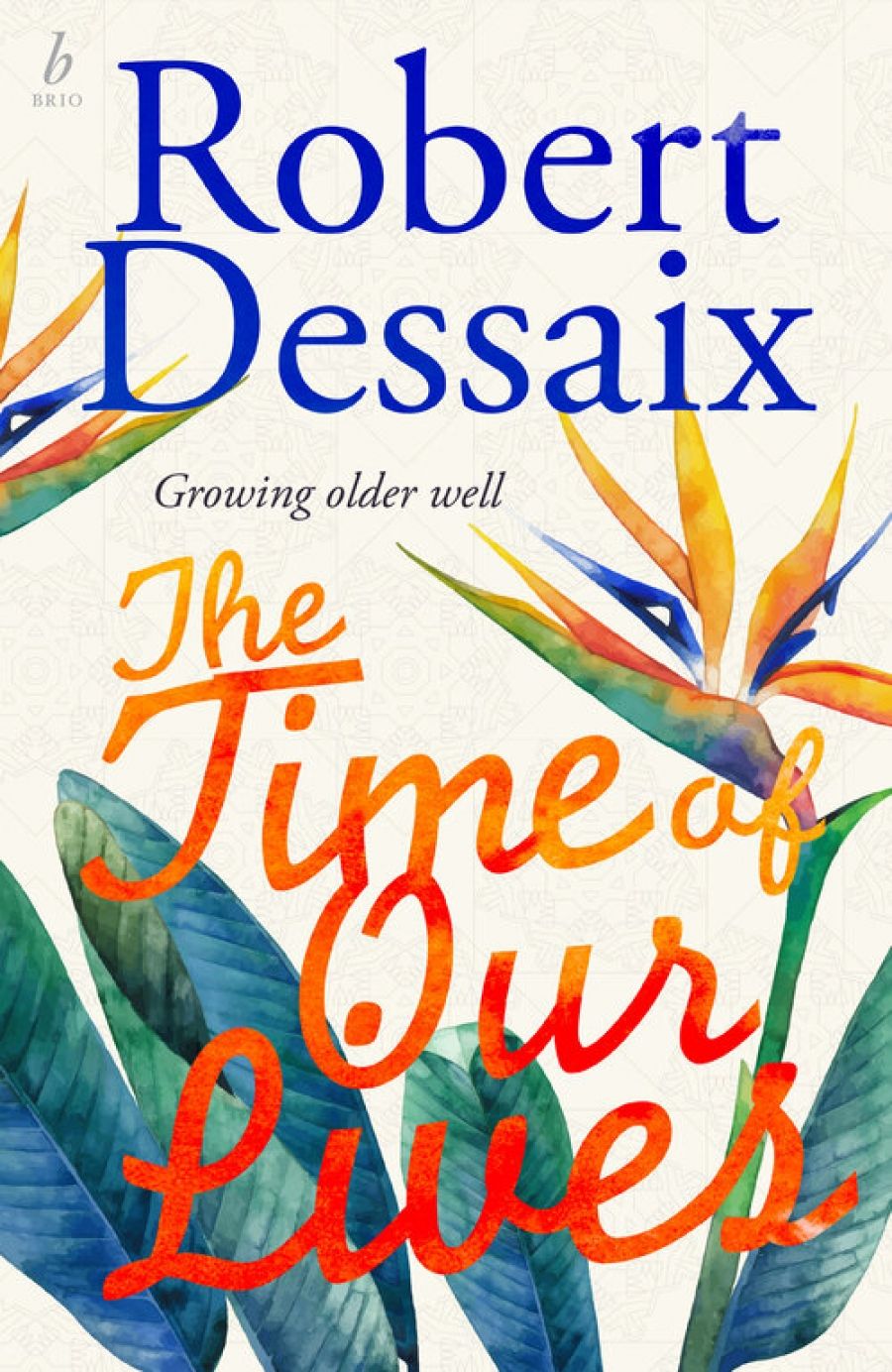
- Free Article: No
- Contents Category: Memoir
- Review Article: Yes
- Online Only: No
- Custom Highlight Text:
In the garden of a hotel twenty minutes from Yogyakarta, a group of hopeful, middle-aged Westerners gyrate anxiously to the strains of LaBelle’s greatest hit. Unlike their young Balinese instructor, they are fighting a losing battle. Why bother? Robert Dessaix wonders. Next morning, his travelling companion answers in her husky smoker’s growl, ‘It’s death they’re afraid of – or at least dying.’
- Grid Image (300px * 250px):

- Book 1 Title: The Time of Our Lives
- Book 1 Subtitle: Growing older well
- Book 1 Biblio: Brio Books, $32.99 hb, 256 pp
- Book 1 Readings Link: booktopia.kh4ffx.net/rvnOv
 Robert Dessaix (Shane Reid/Penguin)
Robert Dessaix (Shane Reid/Penguin)
Growing older well is not about staying taut and trim or preserving a wrinkle-free exterior, says Dessaix, although the question of sex does present a few issues. In a society obsessed with youth and perfect physique, even if you happen to be up for amorous adventures, who would desire cellulite and saggy skin? Being ‘loveable – yes, desirable – not really’ seems a terribly sad way for life to fizzle out. Andrea, another muse, ‘in gauzy pinks and feathery greys, looking rather Bloomsbury’, offers a glimmer of hope. ‘The best thing about growing old is being released from the stranglehold of sex,’ she says, but having more time for friendship doesn’t seem recompense enough for those of us who are not quite there yet. Even Dessaix is perturbed by Andrea’s equanimity.
Dessaix’s eminently quotable ruminations might apply equally to living well at any age: cultivate the ‘life of the mind’, the art of conversation, and, especially, friendship; non-sexual, intimate friendships, of a kind largely out of fashion in Western societies. Caring deeply for and about others is essential, too. ‘Loneliness is the punishment for not caring enough about others,’ says Ingmar Bergman’s gloomy Professor Isak Borg (Wild Strawberries, 1957). Loneliness, not death, is what the elderly fear most in nursing homes isolated from the normality of a heterogeneous community. If you have not already developed an inner wellspring of resources by then, it will be too late. Start practising early, take joy in your own company, and stay open to fresh sensation, Dessaix exhorts the reader.
In the nursing home where his partner’s mother lies dying, ‘catastrophically old, remembering almost nothing’, Dessaix postulates that ‘an intricately configured life of the mind’ might hold us together when bodily systems fail. But what happens when the mind goes? Faced with illness, decrepitude, and dementia, Dessaix is shaken. ‘It claws at your heart,’ he says. ‘How to live amidst such endless suffering? How to find a pathway through it?’ Dessaix aspires to live to a beautiful old age, ‘une belle vieillesse, as the French call it’. That still begs the question: how? If most of us are in denial, in fear of the processes of dying, how much worse, how unimaginable is losing one’s mind? No matter how old we are, we persist in thinking we’re immune.
At funerals, in lieu of shared beliefs, non-believers opt for celebrating the life of the deceased, a few amusing anecdotes, a toast, nothing ‘too genuinely heartfelt’. Dessaix’s impression is that mourners sometimes feel ‘they’re owed a final performance’, as if this might grant absolution from intimations of their own mortality. I disagree with Dessaix that ‘we Westerners shrink from looking’ at a corpse. He fails, in this instance, to take cultural, racial, socio-economic, and geographic differences into consideration. Nevertheless, he is right: under any circumstances ‘saying good-bye is harrowing. It cuts you to the quick.’
It is ritual and the certainty of an afterlife that some non-believers miss. Yet ‘instead of “philosophising”, most of us keep the profounder questions about life and death at bay by giving our minds over to trivia’. An afternoon of gossip now and then, a round of golf, a hand of bridge, or watching Nigella Lawson toss a salad are welcome respite from Weltschmerz, but ‘a lifetime of trivia is surely a tragedy’. Sadly, I suspect most of us prefer our philosophising in palatable doses via Robert Dessaix or anyone who has done the hard thinking for us.
Remaining mischievous, playful yet disciplined, is essential to staying young in mind, if not in body. Dessaix wonders if it’s a ‘gay thing’ or being childless, and proceeds to enumerate the reasons why straight, white men, weighed down with responsibilities, can’t or aren’t interested in remaining childlike. To their detriment, perhaps they don’t have time. One can’t imagine Clive Palmer, for example, being interested in play or having friends or reading, for that matter. ‘Our sense of consequence must first be prised away from our sense of achievement,’ says Dessaix.
The Time of Our Lives will appeal to readers like the author: erudite, leisured, financially comfortable. It is for those for whom intellectual and cultural pursuits have significance over and above economic imperatives; who are as cynical of organised religion and bunkum spirituality as Dessaix and who are as deeply engaged with creativity – ageing fellow-travellers for whom exploration and discovery are an insulation against decline. It doesn’t matter whether you’re interested in opera or jazz, contemporary art, or the Impressionists: it’s ‘curiosity about the world that “binds you to life” when you’re old and need binding, as Gide wrote’. Money helps, of course, but it doesn’t guarantee a graceful fading. There is no magic formula for growing older well, Dessaix concedes, unless it’s ‘to never quite grow up in the first place’. His seemingly meandering text is a meticulously crafted passeggiata. This dextrous stylist leads the reader by the nose to a foregone conclusion: whatever epiphany we seek must come through our own inexpert peregrinations.


Comments powered by CComment